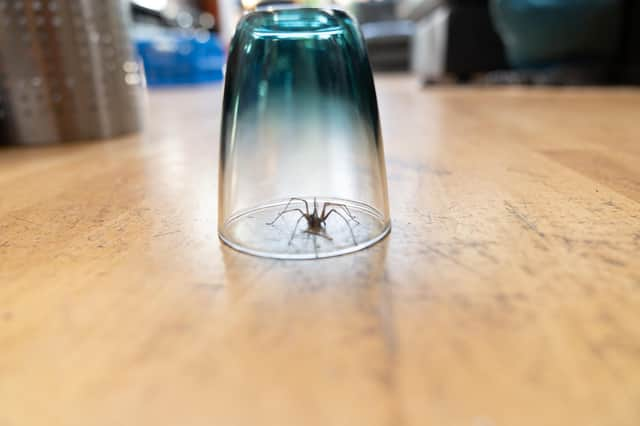September spider season: University of Portsmouth lecturer dubs arachnids 'our friends' as households brace themselves for invasion


The message comes as households brace themselves for an influx of arachnids in September – known as the spider season.
The season usually starts in the first or second week of September and ends by the first week of October.
Advertisement
Hide AdAdvertisement
Hide AdSpiders seen roaming around houses are usually male and are on the lookout for love.
House spiders descend from Mediterranean or North African species – explaining why they like living in warm and dry homes and won't be found building webs in gardens.
Dr Lena Grinsted, senior lecturer in zoology, at the School of Biological Sciences at the University of Portsmouth has carried out research on spiders.
Dr Grinsted said people should not fear spiders and urged those with worries to focus on their positive contribution.
Advertisement
Hide AdAdvertisement
Hide AdShe said: ‘Spiders are our friends and they do an incredible job for our ecosystem.
‘They eat flies, mosquitos and other annoying insects and they are food for birds, hedgehogs, lizards and other important animals.
‘A house with spiders is a healthy house.’
Dr Grinsted’s research has also focused on their evolution of social behaviour, how they live in groups and how they co-operate in caring for each other's babies, and how they hunt and feed together.
Her research has indicated that the smaller spiders are the more social they are.
Advertisement
Hide AdAdvertisement
Hide Ad‘Perhaps the most intriguing consequence of this new hypothesis is the suggestion that working together relaxes selection on body size on relatively large spiders,’ she said following research on their hunting patterns last year.
‘Our argument is that when these spiders start co-operating in catching prey, they can still catch the same really large prey, even if they start to mature at a smaller body size. And a smaller body size carries with it multiple overall fitness benefits when you live in a crowded group.’
SEE ALSO: Motorists warned after M3 crash
A message from the Editor, Mark Waldron
You can subscribe here for unlimited access to our online coverage, including Pompey, for 27p a day.
Comment Guidelines
National World encourages reader discussion on our stories. User feedback, insights and back-and-forth exchanges add a rich layer of context to reporting. Please review our Community Guidelines before commenting.
